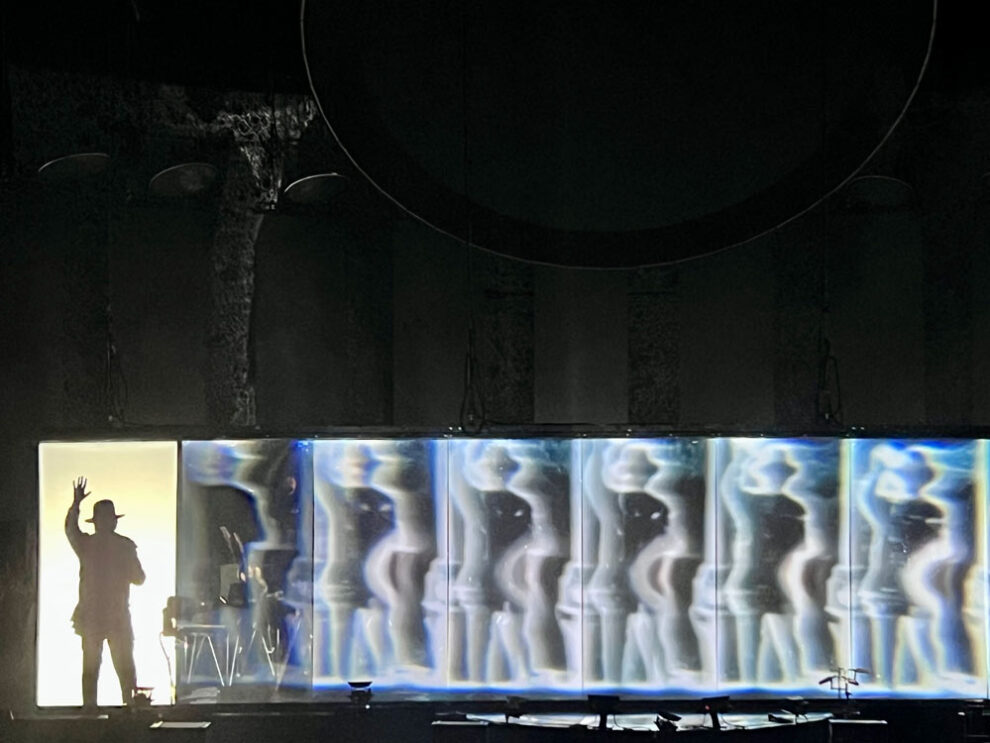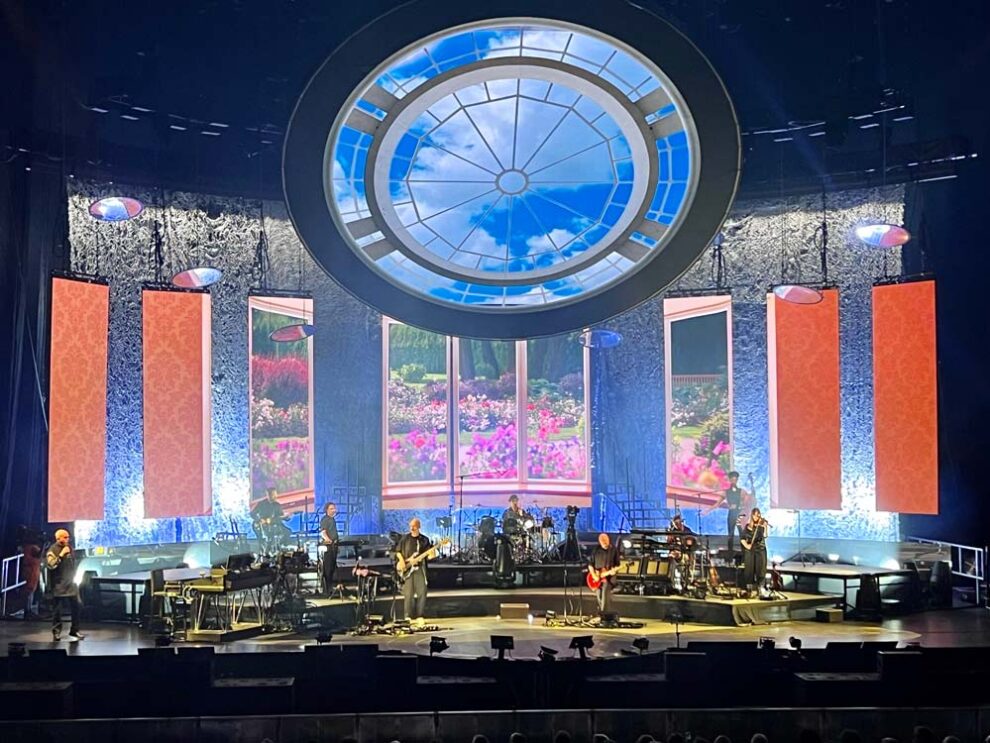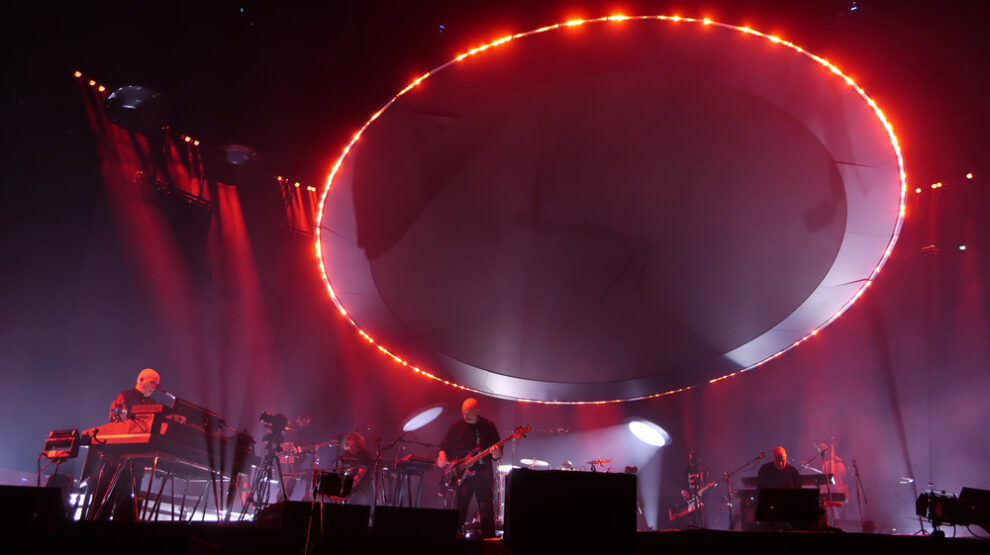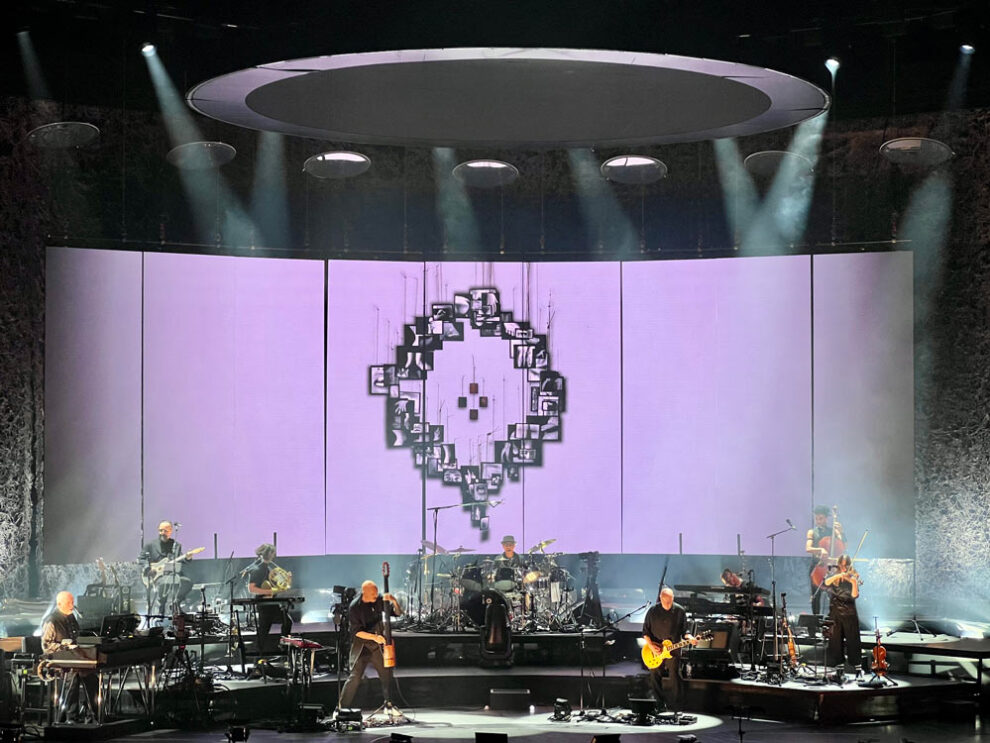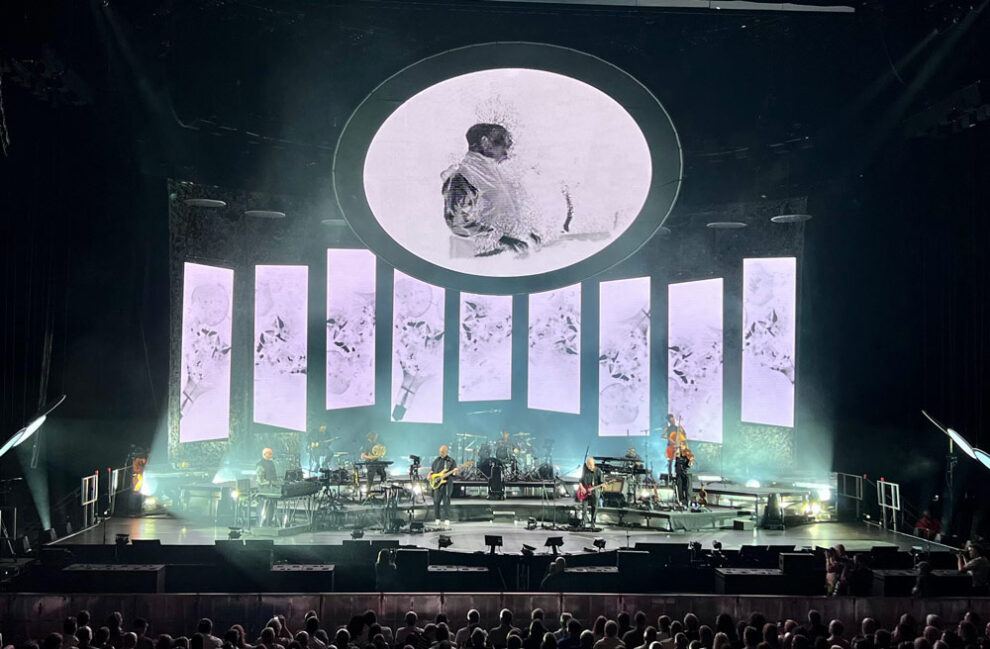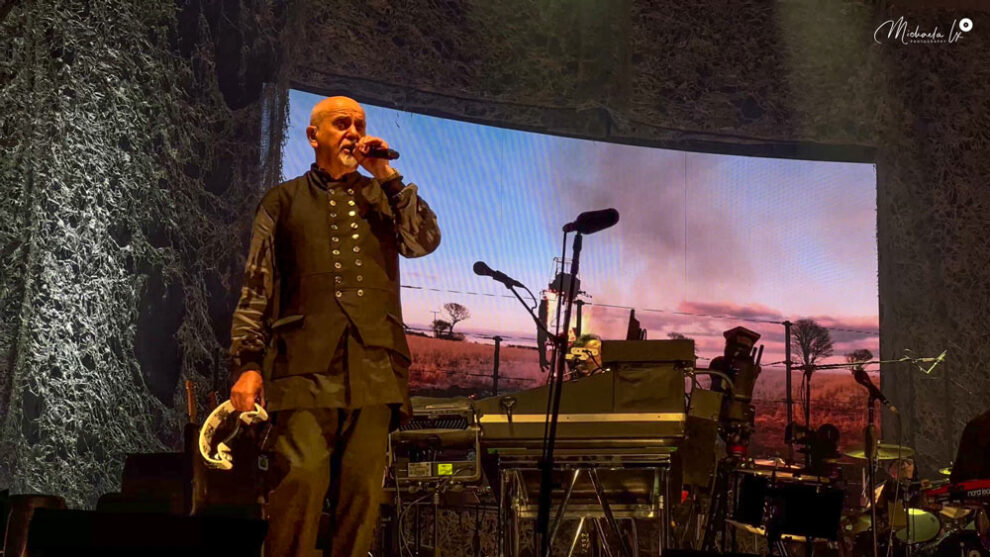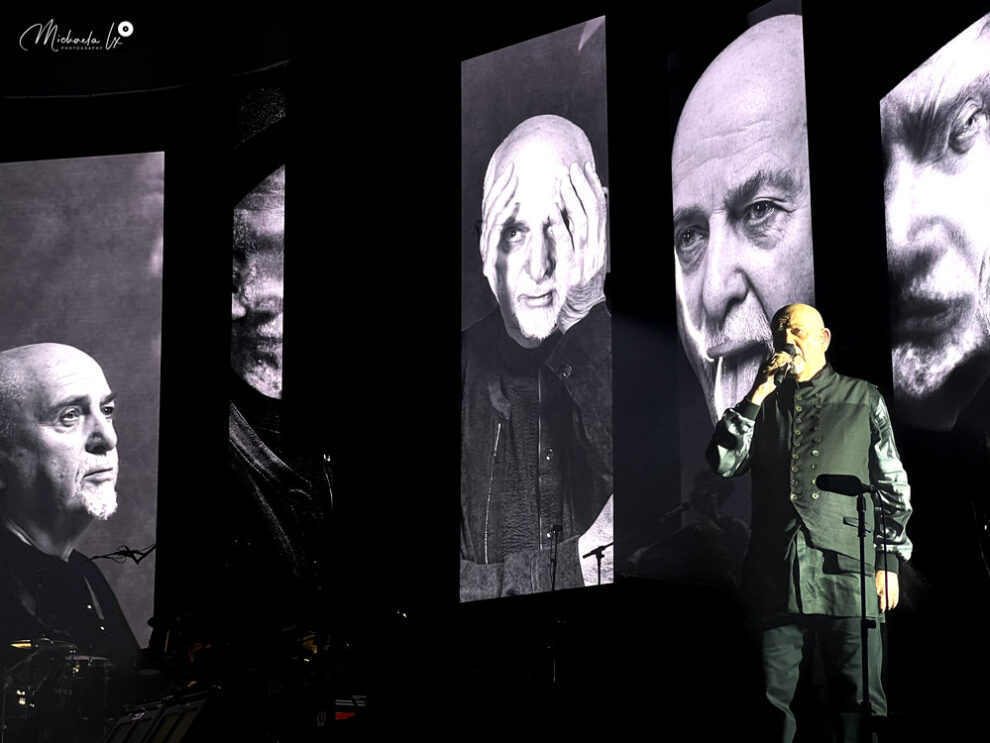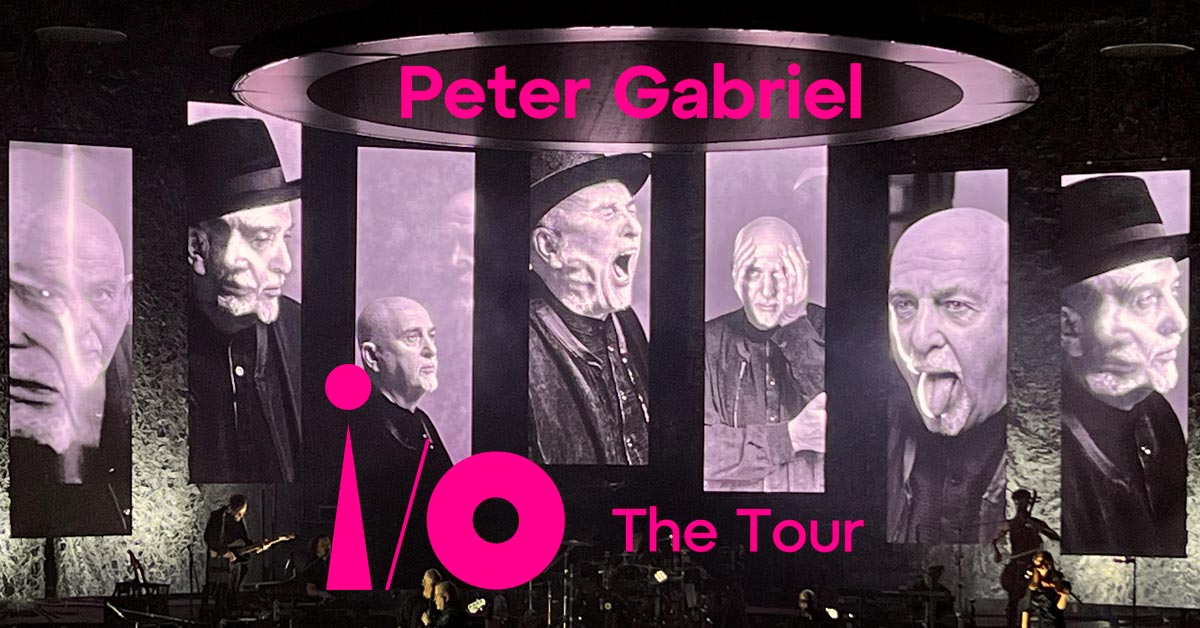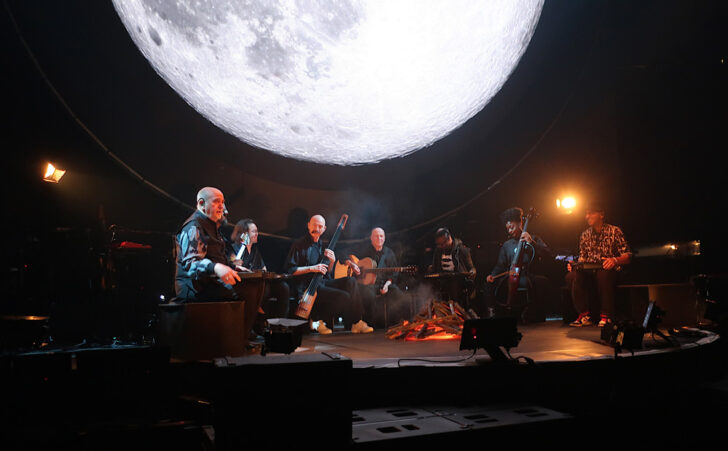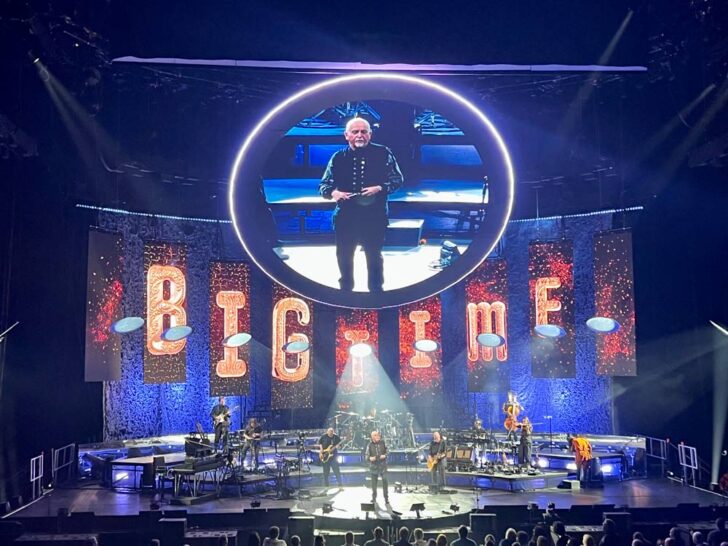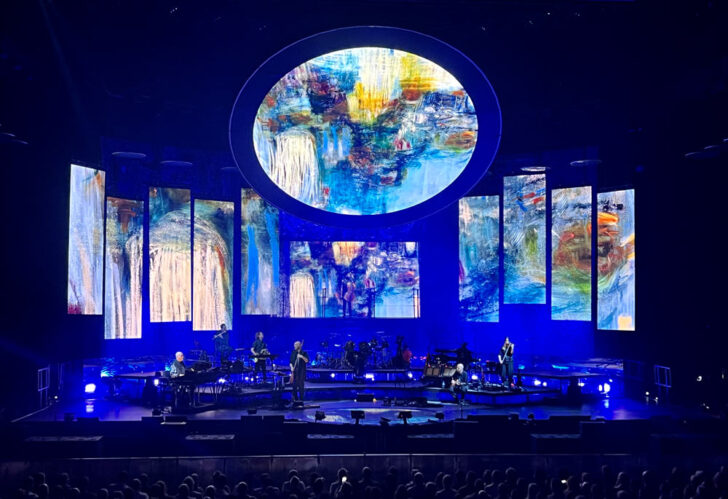- Article
- Read in 14 minutes
Peter Gabriel – i/o The Tour: Europe and North America 2023 – tour review
in 2023, Peter Gabriel went on tour again to promote an album that hasn’t even been released. We look back at the European amd North American shows.
Preface
Fans have been waiting for the new album i/o since at least 2004. Many didn’t believe it, but after the rumours and information about recording sessions in 2021 and 2022, everyone expected an album announcement at the end of 2022. Instead there were concert dates first …
But even that had been foreshadowed over the years. At the latest when it was revealed that the lighting designer for the Genesis The Last Domino? tour also worked for Peter Gabriel (he was actually called by Gabriel in the middle of an interview), one could assume that a Gabriel tour was no longer a distant prospect. Genesis eventually played concerts, but the rumours of a possible Gabriel tour had not yet materialised. Manu Katché and indirectly Tony Levin (via the Stick Men manager) at least revealed that they were blocked for dates with Peter.
But there were actually band recording sessions. Peter openly explained in interviews that they were almost finished. He also talked to fans at his daughter Anna’s EYE-D presentations (see also our report on Milan 2021). And at a meeting in Paris he mentioned that Don-E would be playing keyboards in the live band.
Finally, in November 2022, 23 concerts in Europe were announced for May and June 2023 under the banner i/o The Tour. The album itself was not announced at the time, but there was at least a first teaser with excerpts of the song Panopticom.
At the beginning of 2023, it became clear that Peter was going to release the songs one at a time, each on a full moon, which meant that the complete album would not be available for the tour. This was questioned again and again in the following weeks – apparently many people just couldn’t believe this unusual release strategy.
The Band
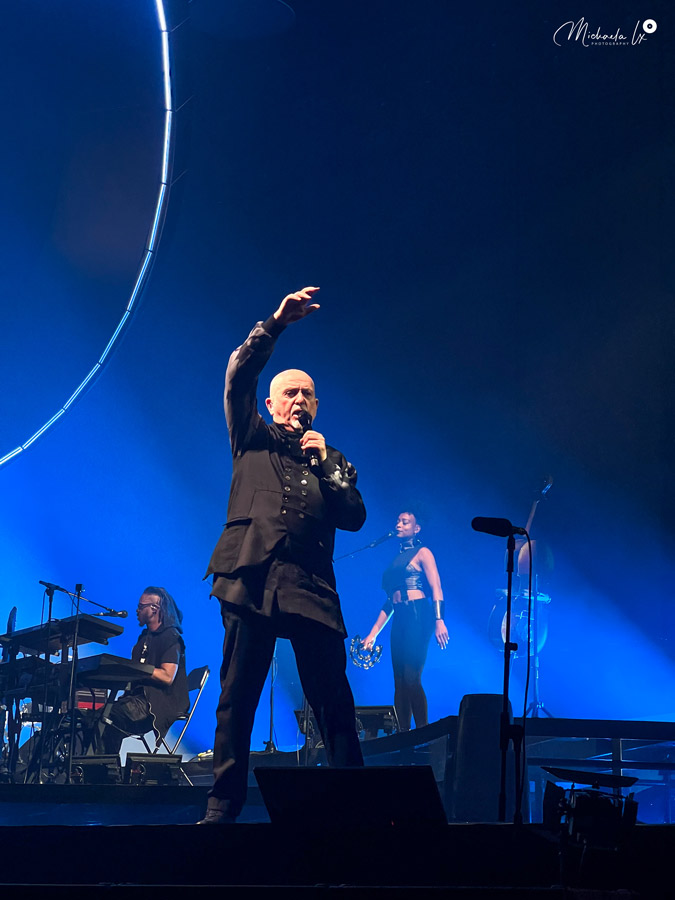
What the band would look like for the new tour was another exciting question. With Don-E (keyboards) a fresh face was revealed relatively early on. At the start of rehearsals, Tony Levin (bass) revealed the rest of the line-up: alongside himself, Manu Katché and David Rhodes, who were practically old hands and whose participation had been expected, Richard Evans was another familiar face returning. Josh Shpak (brass), Marina Moore (violin) and Ayanna Witter-Johnson (cello, piano) were new. Almost all of them were also responsible for the backing vocals.
In summary, we could look forward to a nine-piece line-up with a much wider stylistic range of instruments than on previous tours. It would also be the biggest band Peter had ever toured with (apart from the special New Blood shows).
Rehearsals
The band met in London, initially just for the music, before going into rehearsals for the full stage production.
Tony Levin is well known for documenting his life on tour. Accordingly, his road diary contains a number of entries about the tour and, especially during rehearsals, you could always find out small details in advance (if you wanted to). For example, you could see from the teleprompters that Washing Of The Water was going to be played. You could also see the track Live And Let Live clearly. There were also references to Growing Up and i/o (the song). There was some confusion about a piece of paper stuck to Levin’s keyboard – but it was from previous concerts.
It wasn’t until much later in the tour that a photo of one of the technical monitors in Hamburg revealed that the band had obviously also rehearsed Carpet Crawlers – and that it was apparently intended for the full stage production (at least that’s what the track’s whereabouts in the tech setup suggest).
Tour dates and venues
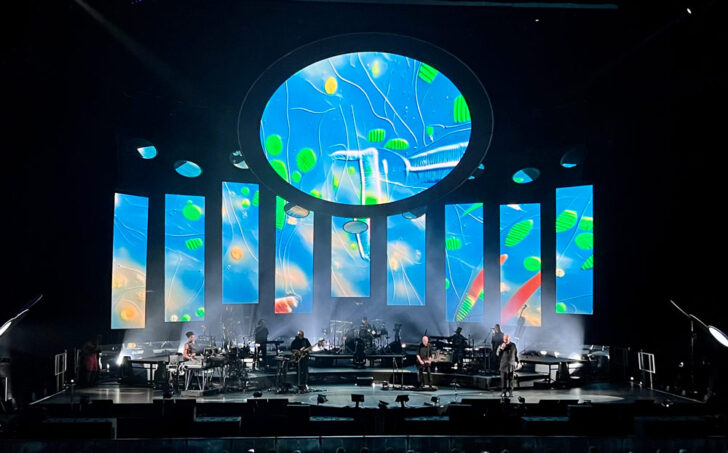
For Europe, 22 shows were announced in twelve countries. Five shows were scheduled for Germany and four for the UK. The tour started in Krakow, Poland and ended in Dublin, Ireland. There was only one concert in Eastern Europe and Northern Italy was the southernmost point. As was often the case on other tours, countires like Portugal, Spain and Greece were left out, as were Austria and the Czech Republic.
An extra show in Nottingham was later added (many had expected a second London show on that date) but then cancelled again “due to logistical problems”. In fact, ticket sales there were very slow.
Most of the shows took place in well-known, larger multi-purpose halls. There were also open air shows in Verona, Berlin, Munich and Bergen. The Lille show took place in a (completely covered) stadium with a reduced capacity. The Berlin and Cologne shows were the ones with the largest audiences.
North American shows were also promised with the announcement of the European shows, but it took quite a while for them to be announced. The dates were then announced in two parts, much to the annoyance of some people who had bought tickets for one show, only to have another one added closer to them.
The 25 concerts in North America (5 in Canada, 20 in the USA) took place in September and October and were relatively well distributed geographically. Basically the classic venues were played. The only surprise was the tour finale with three shows in Texas alone. Like in Europe, each of the cities only had one show.
Tickets, (Pre) Sale and Live Nation
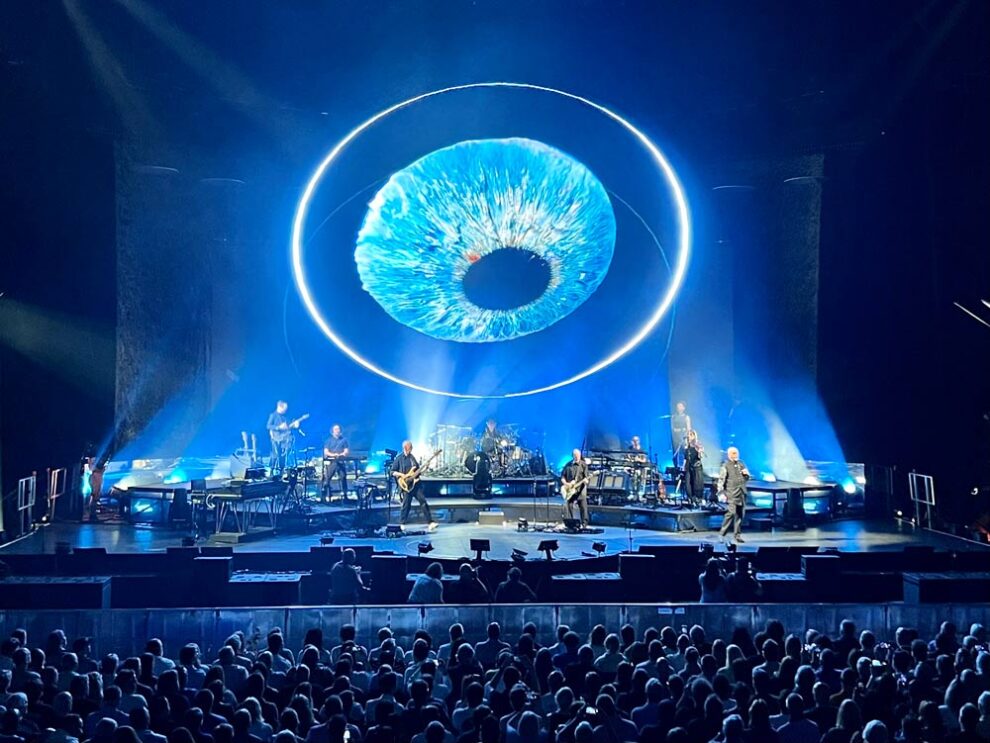
Unlike previous tours, this time the only organiser was Live Nation. The tickets were very expensive and the price level in Europe was very different. 150 Euros for a seat with a reasonable view was not uncommon. Tickets sold well in Italy, France and especially Germany, but in the UK things looked bleak for a long time. Eventually, prices there were reduced to around £65 a week before the shows.
There was rare standing room at the front of the Waldbühne in Berlin and inside in Frankfurt. In Munich there were initially only standing tickets, but later seats were offered, leading to an absurd ticket swap procedure on the day of the concert.
In North America, prices were again significantly higher and all shows took place indoors. Again, there were significant price reductions a few days before the concerts, which helped some shows to sell out. Although there were significant gaps at many shows, others were sold out, such as New York City and Chicago. The West Coast shows were also full.
As usual, VIP packages were available. However, the extras were limited and in no way comparable to those of the last Genesis tour, for example. In fact, the overall VIP treatment was anything but optimal and the VIP goodies ended up being rather cheaply produced gimmicks whose usefulness was very limited. In contrast, Gabriel had included access to the soundcheck in his VIP packages on previous tours.
Setlist
There were relatively few changes to the setlist, which usually looked like this:
Washing Of The Water
Growing Up
Panopticom
Four Kinds Of Horses
i/o
Digging In The Dirt
Playing For Time
Olive Tree
This Is Home
Sledgehammer
(Break)
Darkness
Love Can Heal
Road To Joy
Don’t Give Up
The Court
Red Rain
And Still
Big Time
Live And Let Live
Solsbury Hill
In Your Eyes
Biko
Additional Songs:
What Lies Ahead was first played in Krakow, Verona and Milan (after And Still), then cancelled without replacement – but then, to everyone’s surprise, returned to the setlist at the very end of the North American dates.
So Much was often rehearsed during the soundcheck at the beginning of the tour (it was also on the Verona setlist as an alternative song to This Is Home), but was only played once in Europe: in Copenhagen instead of And Still. Henry Hudson, who did the artwork for the song, was there – which may have been the reason for the rare performance. – But again, it was played at the very end of the American dates – in parallel with What Lies Ahead, which almost always replaced And Still.
Jetzt Kommt Die Flut was played as the opener at the German and Zurich shows instead of Washing Of The Water. Gabriel obviously wanted to sing something in German again for the German-speaking fans. In Detroit he played the English version Here Comes The Flood at this point.
No other songs were rehearsed during sound checks in Europe.
For North America there was an addition with The Tower That Ate People, which they had worked on during rehearsals (as well as Shock The Monkey), but initially only played once in Columbus before Sledgehammer in the first part. Again there was only one reprise towards the end of the tour, but this time it was played several times as the first encore before In Your Eyes.
In total, the show contained 11 to 12 new songs from the i/o album (sessions), up to six of which had not yet been released.
Stage technology and special features in various cities
The stage set-up was largely identical for all shows.
Above the stage was a circular screen with an LED strip on the outside that could be lit in all colours and sequences. This screen was very large, movable and tiltable. During the show it was sometimes used vertically, sometimes at an angle and sometimes almost horizontally above the musicians. The height also varied. It was used to show either live images of what was happening on stage or visual effects and variations on the art of each song.
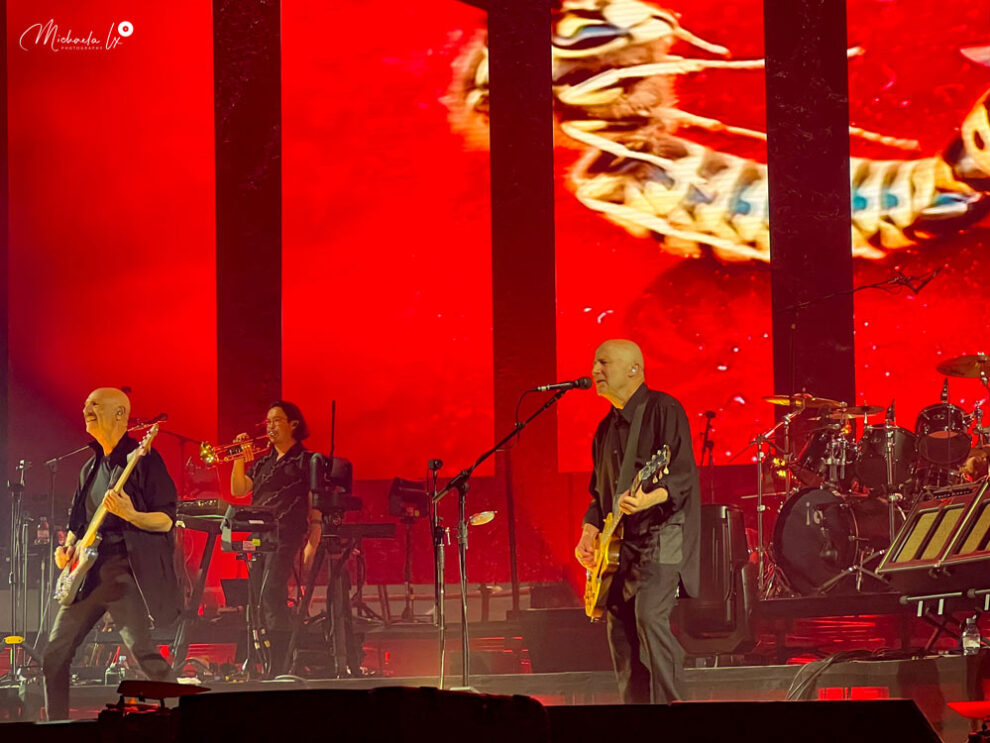
However, this screen could only be used for the indoor shows – in Verona, Munich and Bergen it was available, but fixed in a slightly tilted position so that it could not be manoeuvred. In Berlin, due to the ancient roof construction, a temporary solution had to be installed, which unfortunately wasn’t nearly as good as at the other shows. There were no such exceptions in North America, where all the shows were in well-equipped halls.
The rear part of the stage had 9 movable vertical screens, which were sometimes used individually and sometimes as a unit. To the right and left of the stage, there were two more screens showing the stage action, to which effects were occasionally added (e.g. Panopticom). These screens were absent in Frankfurt due to the construction of the venue.
In addition, there were 15 moveable and height-adjustable circular mirrors, which were very effectively lit from below and could direct the light anywhere. They and their arrangement were also a decorative element in themselves.
Finally, there was a round area on the floor at the centre front of the stage, which turned out to be another screen. Occasionally parts of the artistic designs were shown on it.
The performances and show effects
At the beginning of all the concerts, Gabriel came on stage alone in a very unspectacular way. At first he wore an orange suit like his stage technicians (after a couple shows, he didn’t use this suit any more), and he always had a cap on. He greeted the audience with a bizarre and humorous speech, saying that he was just Peter’s avatar because he was sunbathing by the sea. The start of the show (Washing Of The Water / Jetzt Kommt Die Flut, Growing Up) took place in a semi-unplugged setting in the circle. There was a small campfire in front of the band, which Peter “lit” with a lowered light as part of his speech. At first only he and Tony Levin were in the circle, but eventually all the other band members joined in and Peter introduced them all. Above them was a moon, which rose to a full moon during Washing Of The Water / Jetzt Kommt Die Flut and went down again during Growing Up. The screens at the sides were not used during these songs, so people sitting in the back could hardly notice what was going on.
In Panopticom, an eye appeared on the large round screen and followed Peter across the stage. During i/o, Ayanna Witter-Johnson played Peter’s piano. For Digging In The Dirt, the round screen was tilted completely for the first time, so that it hung horizontally above the stage, giving a clear view of all the screens at the back. These showed photos of Gabriel with various effects and grimaces. The song was given an even more intense feel with the addition of horns and strings. Visually, Playing For Time focused on the track’s artwork. Musically, the song stood out thanks to Peter’s excellent vocals – and a gripping finale that was even more intense than in the studio version.
In general, the artwork for each of the new songs was used for the stage visuals. Only for i/o, This Is Home and Live And Let Live was this not the case. For This Is Home Peter chose a slightly different visualisation and we were shown various motifs of the interior of a house. At least in Europe – in North America David Moreno’s sculptures were also included. Sledgehammer, on the other hand, was presented in a fresh and impressive way, with all kinds of copulating insects on the screens – and the inevitable dance of Peter, David and Tony.
After the interval, a semi-transparent screen was lowered to the front of the stage, onto which shadow plays were projected during Darkness and onto which Gabriel painted colour gradients with a kind of magic wand during Love Can Heal. For technical reasons this screen was not available at the open air shows and was also missing in Milan, Frankfurt and Bordeaux.
Introduced as a battle between Tony Levin and Don-E, Road To Joy quickly became a crowd pleaser and Ai Weiwei’s “finger” was prominent on the screens. Peter sang a duet with Ayanna Witter-Johnson on Don’t Give Up, which was very well received by the audience. A gallery at the back of the stage was also used. This was also left free for The Court, and the video of Tim Shaw’s art performance, in which he ritually burned his curse figure, was shown on another screen in the background.
During Red Rain the circular screen was tilted again and a flickering light changed from white to red to great effect. The song was also the spotlight moment for Manu Katché, who was not only very exposed but also played some breathtaking drums. During And Still, the gallery was used again as Ayanna Witter-Johnson played cello solo – standing for the entire show
Big Time was not only a real visual hit, but was also completely reworked with the new band. Live And Let Live and Solsbury Hillwere both musical and visual hits. Live And Let Live in particular, an unfamiliar piece to the audience, was very popular and also involved the audience, who found themselves on the screens again and again.
The first encore was the almost inevitable In Your Eyes, which featured the nine band members prominently on the nine screens – including the look in their eyes. Musically, Don-E’s little keyboard solo was a particular challenge – as it didn’t really fit in with the song. At the end of Biko, the big screen with the picture of Stephen Biko was lowered vertically so that, after all the musicians had left the stage one by one, Manu Katché disappeared behind it… and the concert was over.
The sound was rated very differently. There were halls where the negative comments predominated, for example Cologne. There were fewer problems at open airs and the comments from Amsterdam, Hamburg and Glasgow were also predominantly positive. In Dublin the fans were able to enjoy perhaps the best sound. Regardless of this, Genesis brought the better sound to the halls last year in comparison.
Another peculiarity of the European leg of the tour was that Marina Moore was absent from about a third of the shows. She came down with corona and did not play after Scandinavia until the Birmingham show. Her parts were pre-recorded playbacks at these shows.
Two shows of the tour were filmed (Los Angeles and Palm Springs), which was obviously a rather last-minute decision. It can therefore be assumed that there will be a concert film.
Merchandise
Motifs that take some getting used to – and are expensive. That pretty much sums it up. There was a range of shirts and hoodies with and without tour dates and with and without the i/o logo. There was also a shirt that said “This Edition Is Limited”, the meaning of which only becomes clear if you know the song So Much, because it’s a line from it. A mug and baseball cap with a simple logo were also offered. The shirts cost 45 euros and up, and the mug 20 euros.
A tour programme wasn’t availavle for quite some time. Although there were rumours that there would be one, it took until Birmingham before it was actually available. But for 25 euros you could get a full 100 pages of bacon. However, there was still the unpleasant aftertaste that you had to get it online afterwards – and that was only possible to a very limited extent. In North America, as expected, the tour programme was there from the start.
All in all
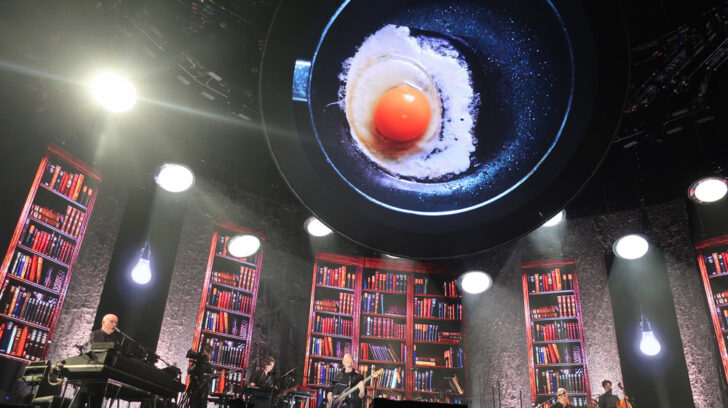
Peter Gabriel got down to business, playing eleven or twelve songs from his new album (including What Lies Ahead, a song not on i/o). And most of these songs were still completely unknown, especially in Europe. Deeper cuts from the back catalogue were rather scarce, although the start with Washing Of The Water and especially Growing Up was not to be expected. With this tour, Darkness should have finally joined the ranks of Peter Gabriel’s live classics. The finale with In Your Eyesand Biko may not be particularly innovative, but it is certainly justified after the demanding programme with many new songs.
But the concert experience was a challenge for the fans. The release policy alone led to discussions and now Gabriel was playing new songs that nobody knew. Of course, these are not songs that make people jump out of their seats, but you could see very positive reactions at many shows, especially during i/o, Road To Joy or Live And Let Live. The vocal performance during Playing For Time was also well received. In the end, you had to watch the concert with concentration to get to grips with the many new songs. And it is remarkable that Gabriel, at his age, is not – like many others – just a kind of jukebox of his back catalogue, but is looking ahead and presenting masses of new music. So it’s no surprise that he put his big hits ‘in between’, and that the songs of the show’s finale, In Your Eyes and Biko, were also safe bets.
In addition to the expanded band, which gave many songs completely new nuances (Digging In The Dirt, Big Time or Sledgehammer), Gabriel’s vocal performance was particularly impressive. Compared to many previous tours, he was in absolute top form vocally and impressed the audience. The length of the show, which lasted around two and a half hours, must also be emphasized positively.
Fans are now waiting for more shows to be announced for 2024. There are no clear signs for or against. But it would be a shame if there was no follow-up. Maybe he will present more new songs that are unknown to us.
Author: Christian Gerhardts
PS: Anybody interested in statistics and numbers may want to check our article about the tour statistics here.
Photos: Ulrich Klemt, Michaela Ix, Christian Gerhardts (taken in Köln, Amsterdam, Antwerp and Dublin)
